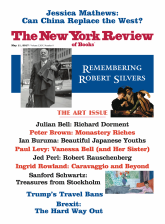In response to:
Why Free Speech Is Not Enough from the March 23, 2017 issue
To the Editors:
David Cole’s review of The Taming of Free Speech: America’s Civil Liberties Compromise by Laura Weinrib [NYR, March 23] provides a concise history of the early years of the ACLU. I do, however, have one quibble with the article. At one point Cole notes that the ACLU’s board in the early 1920s included many of the era’s leading radicals, liberals, and progressives, including social reformers such as Jane Addams, writers such as Upton Sinclair and John Dos Passos, and other notable Americans. This list should have included my grandfather Arthur Garfield Hays, who was general counsel of the ACLU from 1921 until his death in 1954.
Hays had a very distinguished career as a civil liberties lawyer. He was involved in the trials of many of the most notable civil liberties cases of the twentieth century. Perhaps his most famous case was the Scopes trial in 1925, in which a schoolteacher in Tennessee was tried for teaching evolution. Hays was one of a team of three lawyers, including Clarence Darrow, who defended Scopes.
Hays’s tenure as general counsel of the ACLU and member of the ACLU board for many decades was unique in many respects. He was often the most radical voice in the organization. For example, one of the main issues facing the ACLU during World War II was President Roosevelt’s order allowing Japanese-Americans to be placed in internment camps. This issue generated a violent internal debate among members of the ACLU board. Many conservative members supported the president’s order on the ground that military necessity justified the internment order. Hays adamantly opposed the president’s order as a total violation of the constitutional rights of Japanese-Americans. In all the internal debates of the board on this issue Hays passionately argued that it was absolutely necessary for the ACLU to do everything in its power to defend the rights of this group of Americans. This order is one of the most notorious violations of the civil liberties of Americans in our history and Hays has certainly been vindicated by the verdict of history.
Another example of Hays’s leadership on matters of principle is the trial of Elizabeth Gurley Flynn, who was a Communist on the board of the ACLU in the 1930s. A major issue for the organization was whether Flynn should be expelled from the board for being a Communist. Many board members argued that Flynn should not be on the board because she didn’t support principles such as free speech. This issue reached a climax when the organization staged a trial to determine whether Flynn should be expelled from the board. While many board members voted to remove Flynn, Hays voted against expelling her. I believe this position reflected his deeply held belief that Communists and everyone else should have the right to take whatever positions they believed in, including arguments that were inconsistent with civil liberties. He maintained that this position went right to the heart of what free speech should mean in a democratic society. Similarly, he would have defended the rights of the Nazis to march through the Jewish neighborhood in the Skokie case, even though the position of Nazis was anathema to him. He rigorously defended the free speech rights of everyone, even those whose positions were odious to him.
Hays was one of the greatest civil liberties lawyers in American history and he deserves to be remembered for his many contributions to the constitutional rights of all Americans.
Arthur Hays Butler, Esq.
Librarian Emeritus
Rutgers University
New Brunswick, New Jersey



